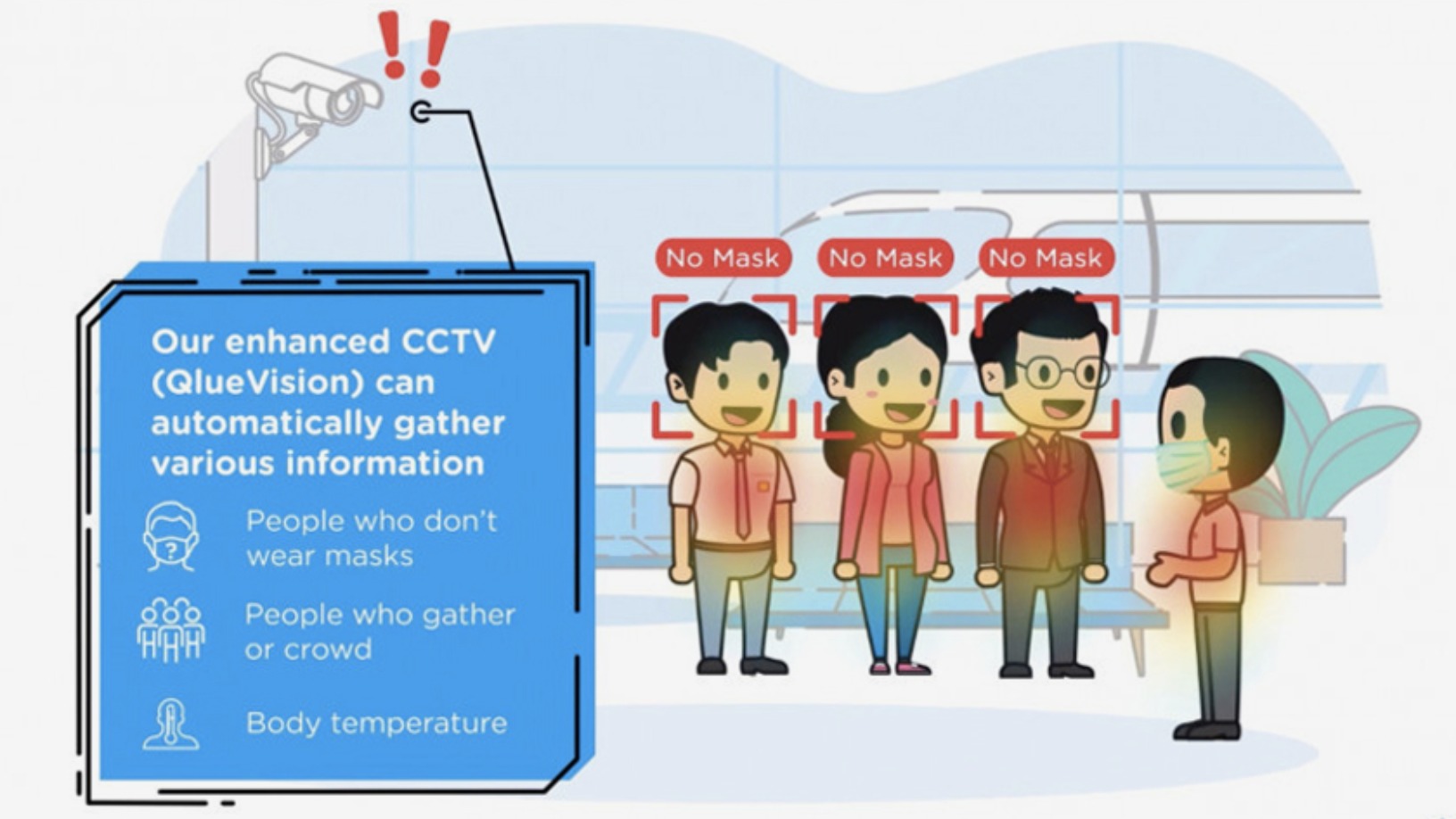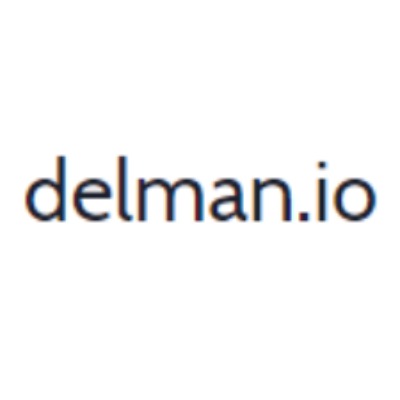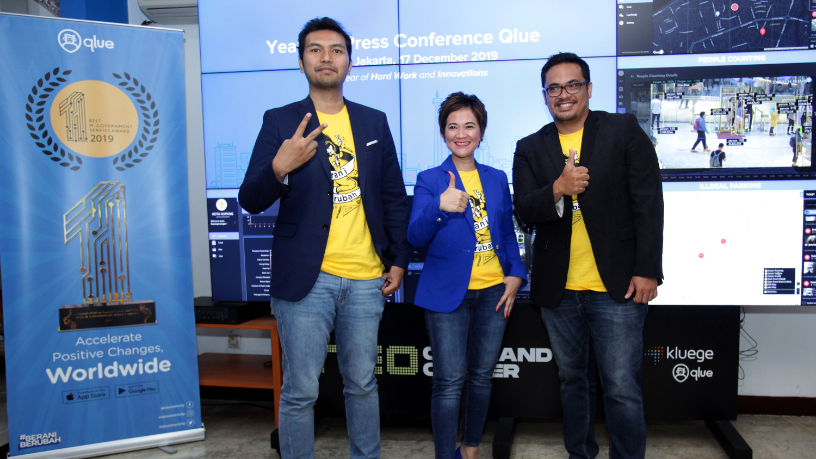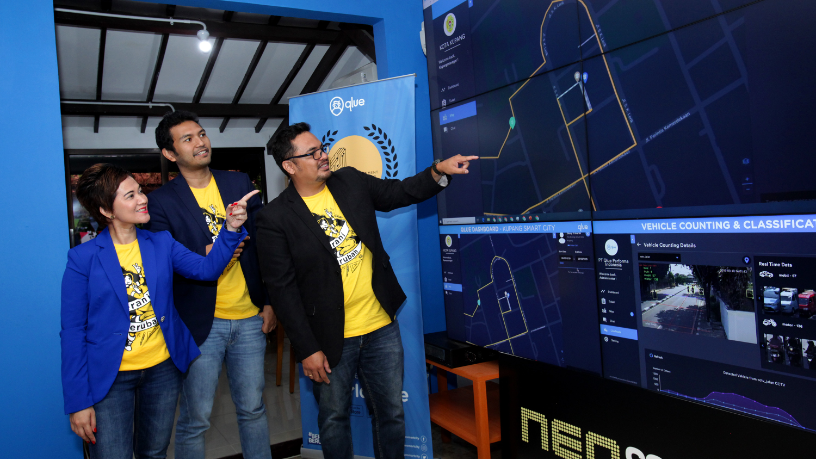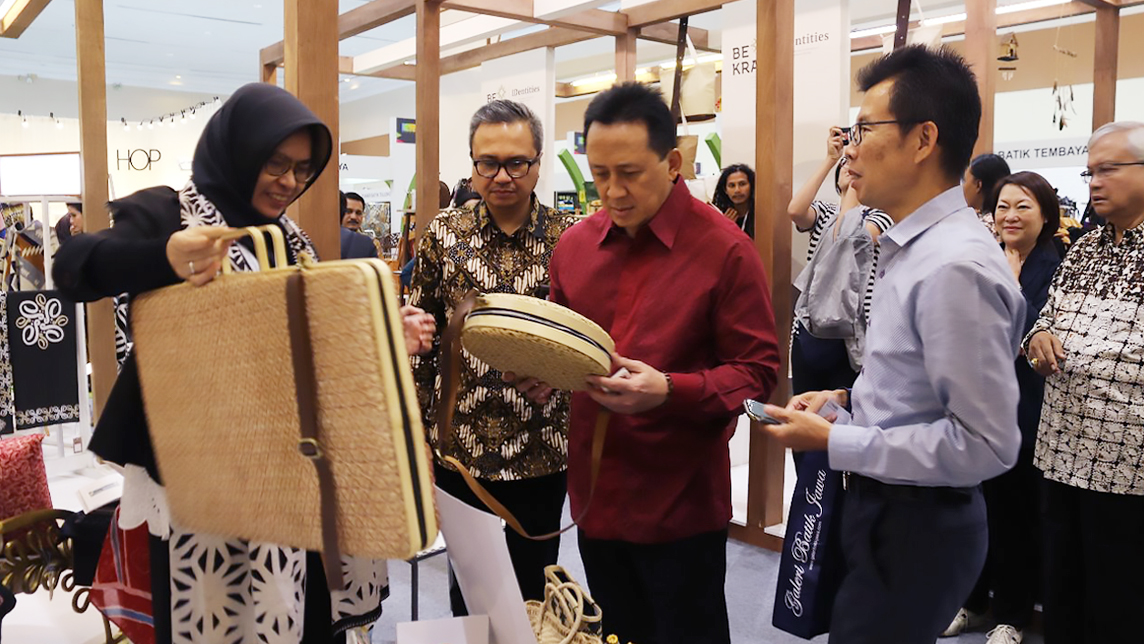Indonesia is facing a rocky path to reopening its economy amid the Covid-19 pandemic, with daily cases currently being recorded in the thousands. Government agencies and private sector companies that want to reopen need to enforce strict measures, such as temperature checking and mandatory mask wearing to keep employees as safe as possible.
Indonesian smart city developer Qlue recently developed new products to help government and private entities enforce these measures. Using its computer vision technology and a thermal scanner, the company has built unmanned stations for employee attendance management and temperature checking. The computer vision system can even recognize employees who are wearing masks and identify those who aren’t wearing them.
According to a press release published on September 16, Qlue has rolled out 150 sets of this new product, named QlueThermal, in government offices, hospitals, and other locations across Indonesia. Trenggalek regency in East Java became the first municipal government to implement QlueThermal at checkpoints located in the city and other locations are set to follow.
CompassList spoke to Qlue CEO Rama Raditya and Chief Commercial Officer Maya Arvini in July to learn more about how the company built these new products in response to the “new normal” of Covid-19. They also shared how the company in general is responding to the uncertainties brought about by the pandemic and how their plans at the end of 2019 have had to change. Raditya and Arvini also discussed Qlue’s investment in big data-processing company Delman and the company’s plans for future investments.
This interview has been edited for length and clairity.
How has Qlue responded to the pandemic in Indonesia since March?
Rama Raditya: Even before the first cases were announced in Indonesia, we had already prepared health protocols and we had limited out-of-town trips for our employees. These served as precautionary steps before work-from-home was mandated in mid-March. When that happened, we closed our office and had all our employees work from their own homes. We prepared the tools needed to track and monitor tasks. Some divisions in our office have been monitoring their work better than ever compared to our regular office-based work, since human error has been reduced.
When the pandemic hit Indonesia, we mobilized our entire ecosystem: the citizen reporting app (QlueApp), AI computer vision (QlueVision), the dashboard, and the mobile workforce app for field officials to get all the reports, as well as the IoT sensors. We asked citizens to report violations of lockdown orders, overloaded hospitals and clinics, shortages in medical equipment, etc. – all in collaboration with the Covid-19 task force. Now we're approaching the new normal, we have released a new thermal scanner camera equipped with AI and IoT.
How is the thermal scanning technology provided?
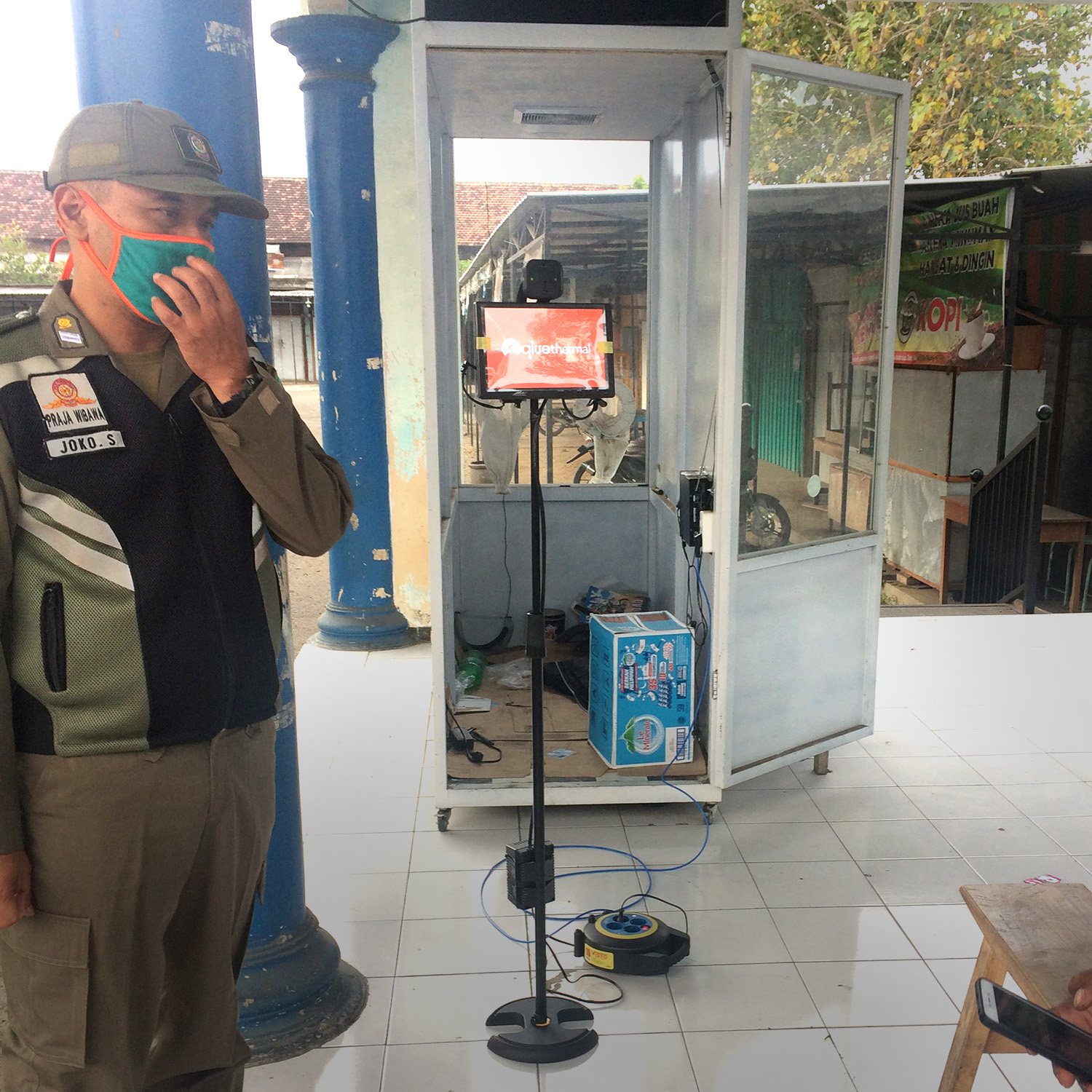
Raditya: The thermal scanning camera and the AI/IoT service is provided in a bundle. All we need to make it work is a power plug. The first important point in this product is accuracy. If you've had temperature checks using thermal guns (non-contact thermometers), you often get a result such as 35.5 degrees Celsius, which doesn't look very accurate or even human. Our product solves that problem. The second point is safety. Some of our clients have had their staff exposed to Covid-19 while they were administering the thermal gun checks. Our answer to that is using an automatic machine for checking temperature. The data is also recorded and linked with office entry logs, along with the number of people entering the premises – whether they're wearing a mask or not.
You mentioned AI and IoT. How do these things factor in, besides IoT being used to record and store data?
Raditya: When someone uses the equipment to check their temperature, they have to face the camera at close range. During this time, we can perform facial recognition, linking the temperature data with employee data and door access control. For less specific applications, for example in shopping malls or other public places, we can gather data such as gender. We can also connect the data with various databases that might include employee data for office access. In the future, we cold perhaps work with the government to check if a patient who is supposed to be isolating at home is actually going outside.
Will the recognition still be accurate if the person is using a mask?
Raditya: Our facial recognition solution was originally developed for CCTV, which has to scan faces from a long distance and at different angles. Even then, we're quite accurate. We see 94-95% accuracy even when the subject is masked. When the subject is closer, i.e., when they are using the thermal scanner, we go back to the original accuracy of 98.8%.
Our recognition solution uses 64 points on the face for capturing and recognition. Most of these are below nose height, but even from the nose up we can get a lot of data, albeit with a slightly lower confidence level thanks to the close-range application.
Has the technology been rolled out? What types of clients are using this product?
Raditya: They come from a variety of industries. We have office building owners, hospitals, shopping malls and other public locations. We are also going to put the machines in bus terminals and in locations as far as Papua and Dumai. Clients are from both private and government sectors.
During the pandemic, has there been a change in the demand for your products?
Raditya: We're getting more demand for our product. Sales-wise, there are some products that have to be put on hold as the clients change their priorities to a more wait-and-see mode. But there's not a lot of them. Qlue was focused on government work before, and with a lot of government funding dedicated to Covid-19, there's a lot of potential to help governments curb the spread using our technology. We're getting more demand and innovation. We're actually busier than we thought we would be this year.
We're actually busier than we thought we would be
In last year's press conference, you said that Qlue is planning to shift its focus more towards B2B after working in mostly B2B. How has this changed?
Raditya: You have to roll with the punches, looking at the conditions now. A lot of B2B projects had to be put on hold when PSBB [the large-scale restrictions] happened. The good thing about Qlue is that it works in various industries, within B2B and B2G. When B2G projects stall, we have B2B to rely on. Now it's the other way around, but that's just part of the game.
In our case, a lot of our B2B projects were put on hold, but then the thermal scanners came out. We knew that when the new normal phase began, thermal scanners would be needed in the B2B market. We are now working with clients we never thought we'd work with, such as hospitals. This has opened up new opportunities. We plan to continue working in the B2B sector this way and we'll have a surprise for SMEs by the end of the year. We want to democratize AI so that not only enterprise clients can use it – the whole SME market can use it.
Qlue did a lot of outreach and marketing overseas. Is there still strong interest from the global market this year?
Raditya: The demand has been higher, but we are focusing on the Indonesia market for now, especially with the limitations on cross-border movement. But believe it or not, we recently exported one of our thermal scanners abroad. We have partners abroad selling Qlue products in Singapore, Malaysia, Bangladesh, Vietnam and the Philippines. Our product is unique because we're the only Indonesian producer for this type of product at the moment, with China being the major manufacturer. We're seeing that 5–10% of the demand for our product is coming from overseas. It's not big, but it's something, considering our focus is mostly in Indonesia.
Are you still on track for double-digit growth this year?
Raditya: Yes, and it could be higher.
Maya Arvini: Our growth has been exponential since we launched the thermal scanners. However, our target has switched from wanting a bigger share of B2B because the sector is still not at full capacity and businesses are managing their priorities. On the other hand, the government is still operating and demand for products that can help prevent the spread of Covid-19 is high. That has become our priority now.
Which departments are hiring?
Arvini: I think we're growing faster than ever. In in the four months since the PSBB began, we've been hiring in all divisions, from engineering, sales and marketing to operations, project management etc. We are still growing. It's a very exciting journey for us.
So Qlue did not have to lay off personnel?
Raditya: No, we did not do anything like that. This does not mean that Qlue is enjoying a windfall with lots of clients suddenly coming to us. We’re not like the groceries e-commerce startups such as HappyFresh or telemedicine startups such as Halodoc, which are getting a lot of business because of the nature of their sector. We had to do a lot of work to adapt and be agile.
We think we did a lot of right things last year that led us to this year's agility, one of which was hiring Maya as CCO. Startups are very vulnerable to certain pitfalls, such as growing aggressively without proper planning once they get funding, giving customers a lot of subsidies, and things like that. When Maya joined, she brought a new mindset. We had to assume that we would not get any external funding anymore, so we have to be a real business. We managed to balance expenses with revenue and even shift into profitability. That's what we did right last year. If we hadn’t, and if we’d done things like over-hiring, over-promising to clients or giving too many subsidies, we probably wouldn't be around now.
It’s been reported that Qlue would be announcing funding this year, in July.
Raditya: Yes, very soon. We are not changing our plans. The announcement will happen soon. The funding is for strategic purposes as part of a strategic partnership. It's not something we're doing because our runway is running out. We have to be careful in using it because it's not ideal to make plans for big expansion in these conditions. We still have the funding from last year. [Editor’s note: The funding hasn’t yet been announced as of September.]
We managed to balance expenses with revenue and even shift into profitability
Which departments will be the priority for this funding and what kind of strategic partnership are you launching?
Raditya: We can't disclose that yet, but it will be strengthening our B2B work. We will be launching some other press releases before this announcement. But we can say that it's for Series B funding.
We read that Qlue invested in Delman. How did the relationship begin and what is the nature of the strategic relationship?
Raditya: Delman is a big data company. If you have a lot of unstructured data and need it processed, you can just throw it all to Delman's platform, where it gets cleaned up, structured, and ready to visualize. The Delman co-founders have worked with us since 2017 in a very strategic project, which only they can do.
All three co-founders are amazing in what they do, but they needed guidance. They lacked the capability to expand their business and run their company operations-wise. So we provided them with support, directed clients to them and integrated some of their services with our products because we get a lot of data work, too. There's a lot of chemistry between our companies so we decided to invest in them.
So it's a long working relationship with them that led to the decision.
Raditya: Yes. Going forward we will be doing more of that, because smart cities are expansive ecosystems. Even the education ecosystem can be connected to this system and use smart city technology, so we're actively looking for startups that can collaborate with us in this field. If there's a good match with the founders and the company, we'll invest – but usually that'll happen within a span of one or two years.
How does Delman contribute to your strategy?
Raditya: Primarily, we embed their product/service into ours, but they also provide us with a lot of insights. We're making full use of their capabilities. Their skillset is quite rare in Indonesia. When our engineers talk to them it's like they're talking to people from a different universe. So it's important to talk to them and to benchmark our work with theirs.
Do you think demand for their services will increase?
Raditya: Yes, especially in government and enterprise. Their clients include PwC, which goes to show how even big companies are grappling with large amounts of data. Before they can visualize anything, they have to structure and cleanse the data. A lot of the data scientists here don't have the capabilities that Delman can offer. They're not just cleansing and visualizing data, but they think ahead; they think about how that data should be structured for machine learning and other implementations.
The Indonesian market might not be ready for this yet, but it's good to be early in the market. We can build something and launch when the market is right. It's the same with us; nobody knew what smart city was in 2014, but our work in Jakarta has become the benchmark that other cities are trying to adopt. After President Jokowi talked about smart cities and how they can solve problems caused by urbanization, it became a hot topic in government. It's going to be the same for Delman, too, with AI and big data.
